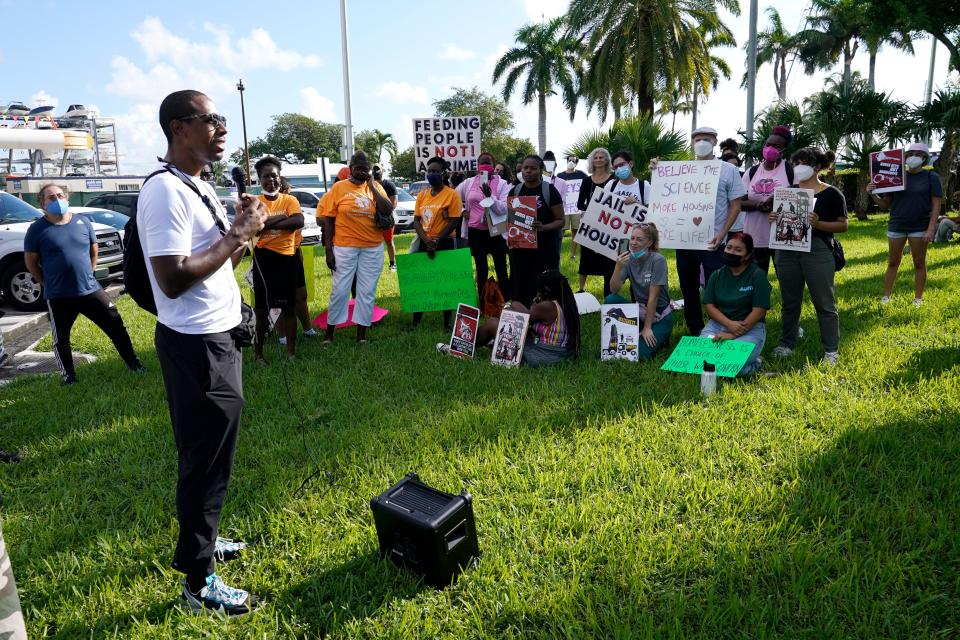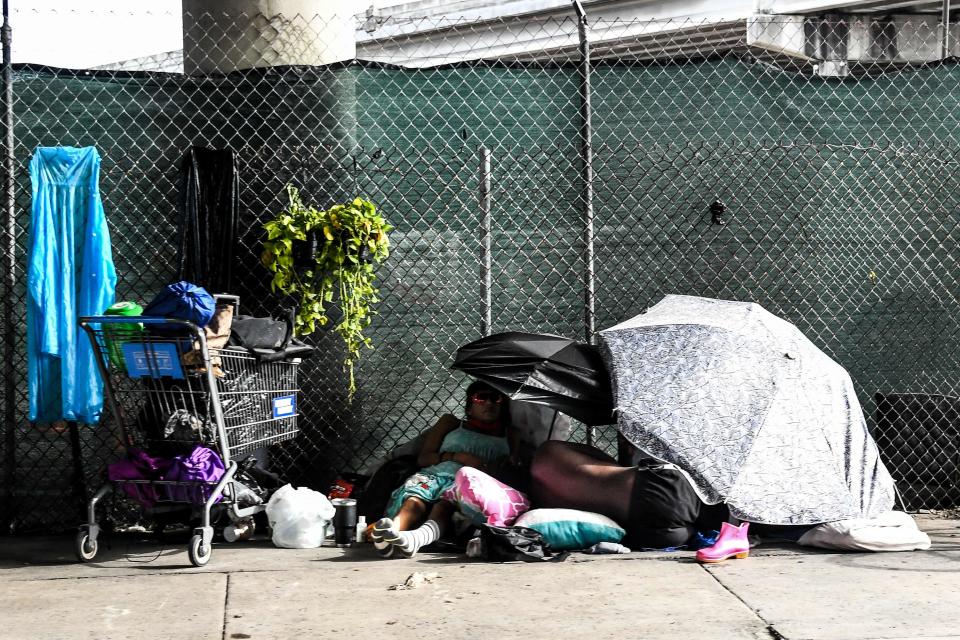Miami commissioner's solution to homelessness? Let them move into your home
MIAMI – A Miami councilman fed up with homeless people living in tent cities in public parks has suggested that advocates for people without housing let them live in their homes.
Then he proposed passing an ordinance to back it.
"I'm sure many of you here are going to jump right up and stand in line to be the first to help," said Miami Commissioner Joe Carollo, who is behind the controversial measure and is running for reelection.
Under Carollo's "adopt-a-homeless" plan, the city would lean on private residents to take individuals experiencing homelessness into their homes in exchange for providing a stipend for utilities, much like state-run foster care programs.
Carollo's proposal is set for a vote Thursday. It came about during a contentious City Commission meeting two weeks ago where he sought to pass another ordinance that would outlaw homeless encampments and lead to the arrests of many living on sidewalks. Dozens of protesters against the measure had taken to City Hall with signs that read: "We are human. We are not TRASH" and "housing over handcuffs."
The frustration boiling over in Miami reflects a growing national debate over how best to help homeless Americans across the country amid a spiraling housing crisis. Officials have tested out tiny home proposals in Seattle and Newark, bans on sleeping in parked cars in California and laws aimed at forcing people into shelters in Texas and Los Angeles.
Many advocates for the homeless across the country are counting on the Biden administration's plans to pour more than $300 billion into affordable housing being debated by Congress. They said the measures currently being implemented from Texas to California and Miami contribute little to getting many people housed.
Policies must put affordable housing at the forefront and include employment training with living wages and health care, said Pedro "Joe" Greer, the founding dean of the Roseman University College of Medicine in Las Vegas and a 2009 recipient of the Presidential Medal of Freedom for his work with homeless patients in South Florida.
"Even if you have a bucket under a faucet, full of water, if you don’t fix the leaky faucet it will fill up again," said Greer.
"When policy is derived from a sarcastic statement," Greer added, "it is both a local and national embarrassment."
Carollo did not return USA TODAY's multiple requests for comment.

Miami grapples with rising inequality
Miami has long been beset by a housing crisis and rising inequality rates on par with Latin America. But tensions over the fate of those experiencing homelessness came to a head during the pandemic, spurred by a record-breaking buying frenzy.
Miami became the second most expensive housing market in the country as people from across the nation descended to take advantage of the warmer weather, no state income tax and looser COVID-19 restrictions while working from home. Suddenly, encampments became a nuisance and the crackdown and criminalization of homeless people was front and center.
"These policies that he has put forth have had real consequences," said Dr. Armen Henderson, an internal medicine physician in the University of Miami Health System who treats homeless patients, of Carollo's proposal. "The fact that he had the audacity to put this forth when people are experiencing real poverty among rising rents and other cascading disasters is deplorable."
Miami will surpass its best year ever for total sales in November, the Miami Association of Realtors reported earlier this month as demand for Miami condos jumped 45.2% in a year. The boom, however, is highly uneven as a household in Miami is expected to pay 81.6% of their median income of $55,171 toward homeownership costs, according to the latest report from RealtyHop, an online marketplace for real estate investors.
Rents have also risen nearly five times faster nationwide than in a typical year, as tracked by Apartment List, an e-commerce platform.
David Peery, an attorney who works with homeless people and who was once homeless himself, called the proposal outrageous, offensive and a "racist dog whistle" at a moment where the city is facing a deepening crisis in need of serious solutions.
"It's meant to bait housing activists and distract from discussing real solutions to solving homelessness," said Peery.
The Miami City Commission's proposal stands in sharp contrast to the federal government's Housing First model of nearly two decades that prioritizes securing permanent supportive housing for people experiencing homelessness.
"The only way to prevent the public health crisis from becoming a homelessness crisis is to fix the affordable housing shortage, '' said Marcus Roth, a spokesperson for the Coalition on Homelessness and Housing in Ohio, one of 1,600 organizations urging Congress to protect existing affordable housing provisions.

People experiencing homelessness are left out of the conversation
Some are ready to take Carollo at his word if the ordinance passes during the vote scheduled for Oct. 28.
Among them is David Winker, 51, a Miami-area attorney. He said for him the question is simple: Am I my brother's keeper?
"I will be one of the first to sign up and I believe many residents will do their part to help out," said Winker.
While initially outraged upon learning about the proposal, Winker said he was more afraid about the fate of so many of the people living in encampments in the city's center.
He went home and spoke with his wife and daughter. He also rang up several members of his church and started a list of people that would be willing to take in homeless individuals.
"The City of Miami Commission has made clear that they are not willing to take any action other than criminalizing the homeless and fire hosing them off the street," said Winker. "So I don't see what choice residents have."
Others are concerned about those who were glaringly absent from speaking at the Miami City Commission – those who are homeless.
People experiencing homelessness are being left out of the conversation entirely.
"Houseless residents must be centered in these conversations. There are several avenues that unhoused individuals have to participate in designing solutions," said Audrey Aradanas, vice president of programs for Miami Homes For All, a local organization working to end youth and adult homelessness.
Henderson, of the University of Miami Health Systems, said if people listened to those affected, their message is rather simple.
"They will say they don’t want shelter. They want an apartment," said Henderson.
Follow USA TODAY national correspondent @RominaAdi on Twitter.

This article originally appeared on USA TODAY: Miami official's simplistic solution for ending homelessness crisis
